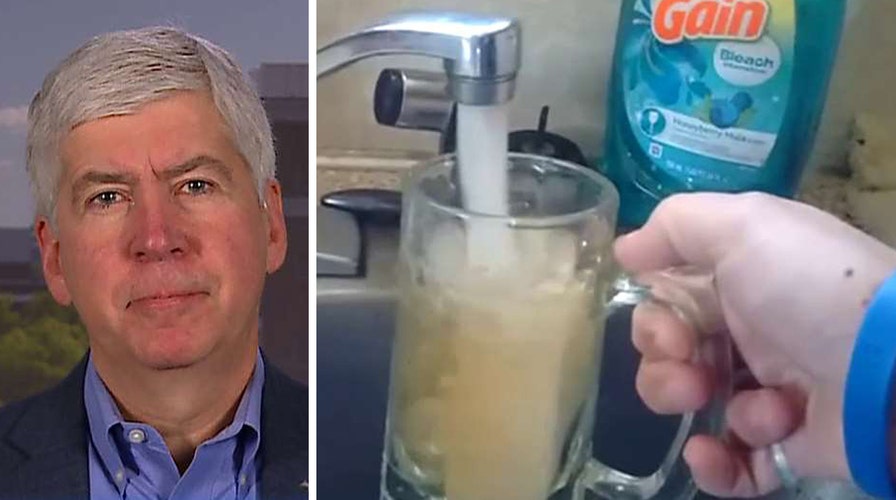Gov. Rick Snyder weighs in on water crisis recovery efforts
Michigan governor talks what is being done to fix the Flint water crisis on 'Fox & Friends'
Lead-tainted water remains extremely high in some areas of Flint, Mich., which is battling to decrease the amount of toxins in its drinking water, according to a state environment agency Monday.
The Michigan Department of Environmental Quality announced the results of a recent water test nearly one month after the city added a chemical to its drinking water to quell the lead contamination.
“It’s decreasing very slowly,” said Susan Masten, a civil and environmental engineering professor at Michigan State University. “I don’t think we’re out of the woods.”
DEQ Interim Director Keith Creagh told the Detroit Free Press he hopes “to be able to say something about the general health of the system come mid-April.”
Creagh said in a release that he met Monday with an official from the U.S. Environmental Protection Agency and that staff from both agencies discussed how to work together to make the best use of data being collected.
The two sides also discussed the DEQ's five-part strategy, Creagh said. The agencies have met regularly since early January.
"These conversations with the EPA are a critical part of our shared response to the emergency in Flint," Creagh said. "We know that moving forward will require all levels of government — along with partners in the business and nonprofit communities and the community of Flint — to work together with the sense of urgency this crisis demands."
Masten estimates if the lead contamination declines at the current rate, it could take 15 months for drinking water samples in Flint to fall below 15 parts per billion, according to The Wall Street Journal. Her estimates are based off the 4,350 tests that were made available over the weekend that date back to September. Lead levels have already decreased from 7.2 percent in November to 5.9 percent in January, but Masten said the levels may not decrease at a quick enough pace.
Michigan Gov. Rick Snyder is urging Flint residents to get their water tested in hopes the home tests will provide a clearer picture on which parts of the city are facing increased issues of lead-tainted water.
Snyder has accepted the responsibility for the emergency while also taking to task state and federal environment regulators. Some have resigned, including the DEQ’s former top official, or have been suspended.
In a letter to more than 46,000 state employees Friday, Snyder said "what happened in Flint can never be allowed to happen again anywhere in our state." He said he wants a culture where workers' "input is valued." He also thanked workers for volunteering in Flint in recent weeks.
Federal officials also said Friday that pregnant mothers and children under six should avoid drinking water that hasn’t been tested because filters might not provide the needed protection at locations testing above 150 parts per billion, according to the Journal. The level is the maximum that filters have been approved for and is 10 times the 15 parts per billion action level for lead in drinking water set by the EPA.
Flint residents dealing with lead contamination will be cleared to drink unfiltered water again only when outside experts determine it is safe. Those who are evaluating the water and will help verify its quality include Marc Edwards, a Virginia Tech researcher who helped expose the lead problem and is providing independent guidance to the city and state.
Meanwhile, music mogul Russell Simmons has joined many well-known entrepreneurs, artists and actors who have visited the city or pledged their support. He went door-to-door Monday delivering cases of water to residents.
The water comes from AQUAhydrate, a bottled water brand partly owned by Sean "Diddy" Combs and Mark Wahlberg that pledged to donate 1 million bottles to the city. The RushCard prepaid debit card system, of which Simmons is a founder, was part of the relief effort.
The Associated Press contributed to this report.


